When Thomas Kost saw the red lights pulsing behind him, he figured he probably deserved a ticket. It was the kind of T-shirt-warm May evening that exists for motorcycle riding, and he’d gotten carried away with the throttle.
Yet right off, Texas Department of Public Safety trooper Rick Cotto seemed to suspect Kost of more than just speeding.
“How much you had to drink tonight?” he asked Kost. “Your eyes are kind of glassy, that’s why I’m asking.” Kost said he hadn’t had alcohol in days.
“You ever been arrested?” the trooper asked, according to the dashcam recording of the stop. “What’s illegal on the motorcycle? What about on your person?”
Nothing, Kost replied.

Cotto asked if he could search the bike. Kost declined. The trooper said he was going to summon a drug-sniffing dog to check it out anyway. The trooper had Kost empty his pockets as he patted him down. Afterward, Kost waited in the tall grass on the side of the highway.
Statistically, police are terrible at determining which motorists are worthy of being detained and searched. Most turn up nothing. Often relying on signs of a driver’s deception that research long has debunked, officers distinguish liars from truth-tellers at a rate barely above chance, studies show.
Historically, any inconvenience to, or humiliation of, those searched unnecessarily has been given little judicial weight. But a steady stream of recorded confrontations between police and citizens has prompted a national re-evaluation of how best to safely and efficiently deploy sworn officers.
Viewed through that lens, the practice of using simple traffic stops as opportunities to search drivers and passengers for other lawbreaking — despite the low odds — is especially fraught, said Sarah Seo, author of “Policing the Open Road,” a legal history of vehicle searches.
“Investigative stops are really ineffective and dangerous,” she said. She has advocated separating traffic enforcement from police criminal work.
Kost, like most people subjected to an intrusive police encounter, headed home grateful he’d gotten only a ticket. “Things could have been so much worse,” he recalled thinking.
Relief soon gave way to anger, however. He was a middle-age, law-abiding product manager for an Austin-area tech firm. What possibly could have warranted the embarrassing treatment he’d received?
Most people who are searched and released swallow their pride and shake it off. Kost decided he wouldn’t.
Wrong most of the time
Texas police performed just under a million searches during traffic stops last year, according to figures reported to the Texas Commission on Law Enforcement. About 1 in 5 resulted in contraband being found.
The agency’s numbers aren’t perfect; it combines several types of searches, and some police departments appear to have entered data incorrectly; TCOLE has rewritten its form for more precise reporting in the future.
“Hit rates” — the percentage of searches yielding drugs, weapons or illegal currency — varied among individual agencies.
San Antonio police reported finding contraband in about 35 percent of their searches. Houston police reported a 25 percent success rate. In Brooks County, in the Rio Grande Valley, the Sheriff’s Office last year found evidence of crime in 1 in 10 searches, according to state data.
Most recent national analyses of traffic stops have focused on the disproportionate rate of police searches of Black and Hispanic motorists. Studies of overall search success have calculatedhit rates in the teens.
Yet even a hit reported by police can include only small amounts of contraband that don’trise to the level of prosecution. A Hearst Newspapers investigation this summer found that only 6 percent of a Fort Bend County Narcotics Task Force officer’s searches resulted in criminal or forfeiture cases.
Police say there is more value to a search than turning up contraband. It may interrupt an impending crime, deter a future one or simply send a message of aggressive enforcement, said Houston Police Officers’ Union Vice President Douglas Griffith. Oklahoma City bomber Timothy McVeigh was apprehended during a routine traffic stop.
Griffith said there is another important factor, as well: Searches fund more searches.
“If you make a seizure of a million dollars, you just secured funding for interdiction for a county for the next year,” he said. Texas law enforcement agencies seized about $50 million in forfeited funds in each of the past five years; proceeds are split between police and prosecutors.
There is no industry standard for what hit rate signals effective policing — or shows a waste of officer time and an unacceptable burden on innocent people.
Hit rates “have always been low,” said Jeffrey Fagan, a Columbia Law School professor whose analysis of New York City’s infamous stop-and-frisk provided the foundation for ending the initiative because of racial bias. But the numbers are accepted because “we have no idea what a good hit rate is.”
Tolerating searches that turn up nothing is a reasonable public price for the law enforcement benefit, Griffith said: “To me, if I know I didn’t do anything wrong, it’s nothing more than a minor annoyance.”
Others say that’s an outdated view that fails to account for the cumulative cost of having 70 to 90 percent of innocent people endure searches that yield little but resentment and distrust.
“I think the payoff is not worth it,” said Maj. Mike Lee, who oversees the Harris County Sheriff’s Office’s Patrol Bureau. Say “we stop a thousand cars a day. And we make a great arrest that day and we put it all over social media. But in the meantime, you pissed off 999 citizens who may have all been pro-law enforcement before you stop them, and now have such a bad taste in their mouth after that stop.
“At the end of the day, we lose.”
Pulsing veins, twitching
After checking Kost’s paperwork, Cotto returned to where Kost was waiting. “You seem awfully nervous to me,” he said. “You keep looking away. You’re having a hard time making eye contact. I feel like you might be hiding something from me. That’s the way I feel.”
“I’m sorry you feel that way,” Kost said. “That’s not the case.”
Police once needed probable cause that a crime was occurring to investigate motorists during a stop. But in 1968, the U.S. Supreme Court allowed brief stops based on a lower standard of “reasonable suspicion” of wrongdoing. A later decision clarified that if the officer can’t specify why he suspects a crime is afoot, a traffic stop may last only long enough to check the driver’s paperwork and write a ticket or warning.
Yet “reasonable suspicion isn’t scientific,” author Seo said. Police have identified a wide range of suspicious behavior to justify turning traffic stops into criminal investigations.
Officers have cited a driver’s pulsing veins, “limbic movements” (twitching), shifty eyes and windows that don’t roll down (suggesting drugs hidden in the door panels) as signs of potential criminal activity. Based on their “training and experience,” they’ve flagged as suspicious cars smelling too much like air freshener, vehicles that are too clean or too messy, erratic driving and driving that appears too cautious.
Often, “you end up with a lot of gobbledygook,” said Patrick O’Burke, a former deputy commander at the Texas Department of Public Safety who oversaw drug law enforcement and now trains police on interdiction.
Police say there are so many clues because every encounter is unique. “It’s individual to each stop,” said Corky Schalchlin, executive director of the Texas Narcotics Investigators Association. “There are a lot of different factors.”
Still, some have questioned the anything-fits definition of suspicious behavior.
“Because drug traffickers have been seen breathing, then breathing is an indicia of drug trafficking,” Chief Justice Brian Quinn of Texas’ 7th Court of Appeals in Amarillo sarcastically wrote in a recent decision. “Most anything can be considered as indicia of drug trafficking to law enforcement personnel.”
Kost displayed several behaviors indicating he was not telling the truth, thus suspicious enough to search, Cotto reported. He “kept looking toward my patrol car and then looking back at his motorcycle,” the trooper wrote. “He also kept touching his face with his hands and wiping his mouth and popping his knuckles.”
One reason traffic searches can yield low success numbers is that clues police often use to identify criminal-seeming behavior such as nervousness have been debunked by researchers. “There are no nonverbal and verbal cues uniquely related to deceit,” a 2011 review of deception research concluded.
A 2005 study of Texas police found officers performed barely above random chance in being able to discern a person telling the truth from a liar. One reason: Most relied on nervous tics — failure to hold eye contact and certain body movements and speech patterns — commonly believed to be signals of lying, despite research showing little connection.
A new Harley
After a drug dog circled his motorcycle three times without finding anything, Kost finally was allowed to ride back to Pflugerville. “At first, I was just glad to come home,” he said. “But I also knew right away; this didn’t seem right to me.” He figured his motorcycle club vest must have raised Cotto’s suspicions.
Cotto, who since has left DPS to manage security at his church, did not respond to interview requests.
Kost wondered if he had a legal case against Cotto. In 2018, Harris County paid a reported $185,000 settlement after deputies pulled over a driver for littering and ended up conducting a cavity search on her in a gas station parking lot. Two deputies were indicted, but the charges were dismissed. The department changed its policies to require that such searches be performed at a hospital.
Yet Kost only endured an hour of roadside inconvenience because a law enforcement officer had guessed wrong. No attorney wanted the case.
Innocent people rarely protest meritless searches. The overwhelming number of legal challenges occur in suppression hearings, when an officer’s suspicions were correct; contraband was discovered and the defendant seeks to have the evidence tossed on procedural grounds. Scholars say the parade of guilty defendants can skew judges’ views on the success rate of traffic searches.
Filed in early 2019 with the help of an Austin attorney who represents motorcyclists, Kost’s lawsuit against Cotto provided a statistically more common narrative: After a traffic stop, a roadside search based on little more than an officer’s hunch turned up nothing. Kost said he sought only an apology.
Cotto argued that Kost’s “excessive nervousness in his body language” was suspicious enough to warrant an investigation. Last May, U.S. District Judge Robert Pitman disagreed.
“Nothing about Kost’s ‘speech’ or demeanor sounds or appears unusual,” he wrote after viewing the dashcam video. Soon after, lawyers for the Texas attorney general’s office said they were ready to settle.
The sides agreed on $11,000 to compensate Kost for the unjustified intrusion. The check arrived in August.
But “it was never about the money,” Kost said. He used the settlement to buy a new Harley.
Make sure you have subscribed to our Facebook page or Twitter to stay tuned!
Source: LMT Online
